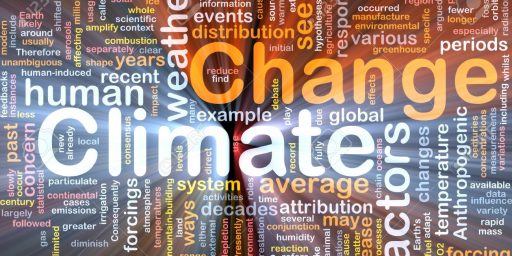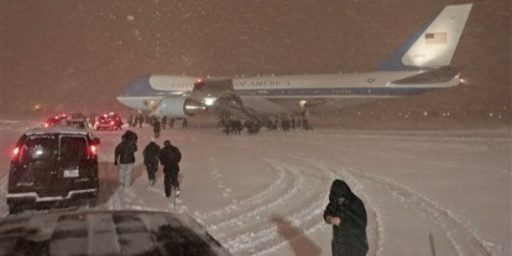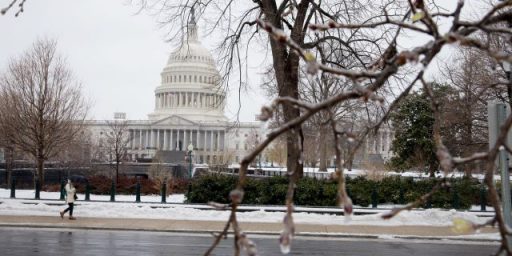Global Warming: Baby, It’s Cold Outside
I realize that these things are not mutually exclusive, but why is it that new studies proclaiming the hazards of global warming seem invariably to be released during record cold snaps?
Global warming is ‘twice as bad as previously thought’ (The Independent)
Global warming might be twice as catastrophic as previously thought, flooding settlements on the British coast and turning the interior into an unrecognisable tropical landscape, the world’s biggest study of climate change shows. Researchers from some of Britain’s leading universities used computer modelling to predict that under the “worst-case” scenario, London would be under water and winters banished to history as average temperatures in the UK soar up to 20C higher than at present.
Globally, average temperatures could reach 11C greater than today, double the rise predicted by the Intergovernmental Panel on Climate Change, the international body set up to investigate global warming. Such high temperatures would melt most of the polar icecaps and mountain glaciers, raising sea levels by more than 20ft. A report this week in The Independent predicted a 2C temperature rise would lead to irreversible changes in the climate.
Record Snow to Hit Boston (Boston Channel)
The National Weather Service predicted up to 10 inches for the Boston area and Cape Cod. Central and western Massachusetts were expected to get from 3 to 8 inches. Though the snowfall forecast seemed paltry compared to the 38 inches that fell on some coastal towns near Boston on Saturday and Sunday, it was still bad news, even for winter-hardened New Englanders. Maurice DuBois, 55, was making some extra money by shoveling the sidewalk in front of some businesses on Northampton’s Main Street. “This is just another winter to me,” said DuBois, a New England native who also lived in Alaska. “But the older you get, the more you dislike it. It’s hard on the body.”
More snow was particular troubling for Cape Cod and the islands, where the weekend’s massive snowfall knocked out power to thousands of homes and some roads remained unplowed two days later. “It will be near-blizzard conditions at times (on Cape Cod), with the winds increasing tonight,” said Tracy McCormick, a meteorologist with the National Weather Service in Taunton.
If the forecasts are accurate, Boston, Worcester and Providence, R.I., figure to set new snowfall records for January, she said Boston had 37.7 inches of snow this month before Wednesday’s storm. The record is 39.8 inches, set in 1996. Worcester, with 43.8 so far, was to expected to get 4-8 inches, which would surpass the record of 46.8 inches set in 1987. In Providence, which has had 34.5 inches of snow this month and was expecting another 4-8 inches, the current record is 37.4 inches, set in 1996.
I’m just sayin’….





And then there was the report I posted… and I think you did as well, about how if it wasn’t for greenhouse gasses the place would have frozen over a few decades ago.
The credibility of these reports would be questionable on their own. Then add the timing, as you note, and the whole thing becomes outright laughable.
I think the problem here lies with equating “global warming” with an expectation that the entire planet is going to acquire tropical meterological characteristics.
Greenhouse gases (e.g. CO2, methane, nitrous oxide),as Bithead suggests, are necessary for trapping the sun’s energy–without them the earth would be uninhabitable. They are naturally occuring.
Scientific consensus suggests that human activity over the past century or so has increased the output of these gases and that, consequently, the amount of solar energy trapped in the atmosphere has also incresed. Because atmospheric temperature is an important variable in determining global meterological patters, the increase in atmospheric concentrations of these gases is undoubtedly having an effect on climate.
Because the earth is a climatologically diverse place, the effects of global warming will be different throughout the globe. Thus, extreme temperature shifts–either high or low–could be attributed by aggregate global warming.
One of the problems with the understanding of the issue of climatge change is the poor reporting in the media and a general scientific illiteracy in the US.
More specifically, both Europe and, to a lesser degree, the northern half of North America are warmer than they should be given warm waters flowing in a south-to-north current in the Atlantic Ocean. Melting of the polar ice caps would bring in colder waters, which cancels out that effect and leads to colder weather in North America and Europe.
James,
Check out the National Geographic Society’s report on glaciers in Alaska now vs. 100 years ago.
http://news.nationalgeographic.com/news/2001/12/1217_alaskaglaciers.html
Is Warming Causing Alaska Meltdown?
Hillary Mayell
for National Geographic News
December 18, 2001
Alaska’s glaciers are retreating, reports glacial geologist Bruce Molnia. Significant glacier retreat, thinning, stagnation, or a combination of these changes characterizes all 11 mountain ranges and three island areas that presently support glaciers.
Alaska is home to around 2,000 valley glaciers, including nearly 700 that are named. Fewer than 20 are advancing, according to a major study presented by Molnia, a U.S. Geological Survey scientist, at the annual fall meeting of the American Geophysical Union held December 10 to 14 in San Francisco.
What this means in terms of global warming and human impact on global climate is complex.
“We are certainly experiencing a climatic change that’s having a pronounced effect in some areas of the world. But we don’t know what component of the change is natural versus what’s human induced,” said Molnia. “The Earth is not warming uniformly. In Alaska there’s no question it’s warming, and has been for at least the last five decades. But whether this is a function of natural climate processes or driven by human activities, we just can’t say.”
I take a look at the global warming study, and the Independent’s ludicrously hysterical coverage of it, here:
http://ridingsun.blogspot.com/2005/01/shrinking-polar-icecaps-and.html
Also, two men here in Japan were killed today when the roof of their inn collapsed due to the weight of the snow piled up on top of it.
The truth is that we are only beginning to understand climate variability. I am deeply skeptical of the predictive value of present models, which is what matters for policy making.
As a non-fan of the Precautionary Principle, my advice is: Don’t just do something. Stand there.
If you know that a locally cold snap proves nothing in the face of global warming, why post it? Especially when you know people like bithead or the WSJ editorial board will run with it. (They seriously did take up space in a mostly-excellent paper with this argument. I haven’t read a WSJ edit since.)
The logic is quite similar to saying “If the Earth is so round, Mr. Science Man, how come when I put a ball on the ground it doesn’t roll away?”
The theory that explains everything explains nothing.
And if the end result is Alaska gets warmer and Europe gets colder, isn’t it all just cancelling itself out? Maybe it should be called “global climate redistribution.”
Hey, let’s throw logic out the window, yes?!
You acknowldge at the beginning of the post you have no basis in logic for what you’re saying, so why say it? By the way, up here in the Northwest, we are having a record *warm* winter. But, I’m not going to claim that it’s due to global warming. However, the fact that the annual snowfall & snowpack levels have been decreasing for 50 years here in the NW may have something to do with global warming. But what do I know?
You acknowldge at the beginning of the post you have no basis in logic for what you’re saying, so why say it?
To make you mad.